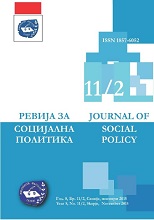Меѓугенерациски врски: системи на поддршка на старите лица
Intergenerational links: support systems for the elderly
Author(s): Žaklina AtanasovskaSubject(s): Social differentiation, Social Theory, Family and social welfare, Demography and human biology, Gerontology
Published by: Филозофскиот факултет во Скопје
Keywords: intergenerational relationships; intergenerational support; components of intergenerational support; elderly people; adult children; grandchildren;
Summary/Abstract: The aging of the population is a challenge for intergenerational support, privately within the family and public in the society. Concerns about intergenerational support are most often found in the younger generation: Will the younger ones continue to support the elderly? Within families, the question would be, do adults want and will be able to help their elderly parents? Intergenerational family ties are made up of both sides and should be equally interested in how aging the population can affect the two generations. Parents help their children for the most part and try to protect their children even when they need help. It is understood that the personal expectations and personal interest of the younger ones will influence how adults will behave toward their elderly parents. Subject of research in this paper are intergenerational links as support systems for the elderly and are studied through the six components of intergenerational support that allow for perceiving how intergenerational relationships affect intergenerational support. According to Bengtson and Schrader (1982); McChasney and Bengtson (1988), six dimensions of intergenerational support are defined: 1. support through friendship; 2. support through affection; 3. support through consent; 4. functional support; 5. normative support; 6. structural support. The conclusion of this research is made up of several segments: a) presents the new forms of intergenerational relationships, b) allows the perception of existing family relationships, c) reveals the causes of harmonious or disturbed intergenerational relationships, d) gives an account of the thoughts of the two generations, e) the analysis of the elements of the six components of intergenerational support allows for the identification of measures to overcome the misunderstandings between generations.
Journal: Ревија за социјална политика
- Issue Year: 2015
- Issue No: 11/2
- Page Range: 339-360
- Page Count: 22
- Language: Macedonian

